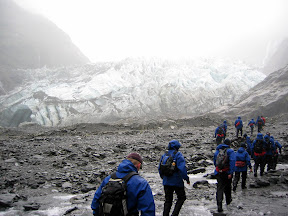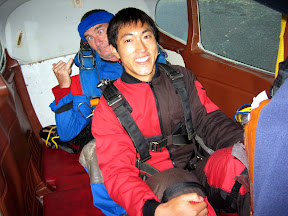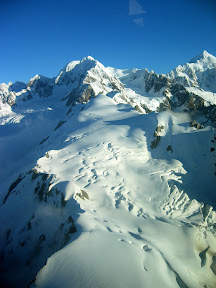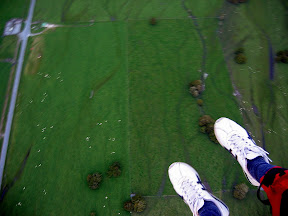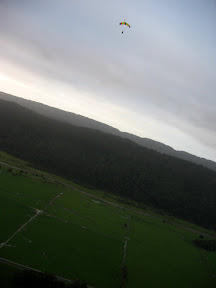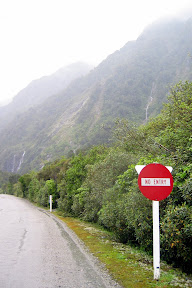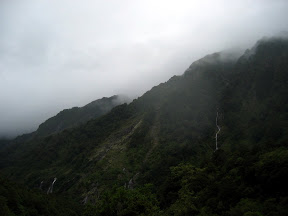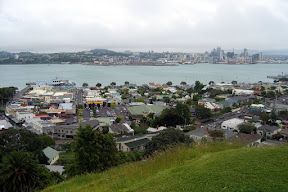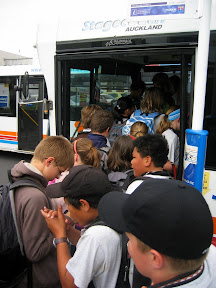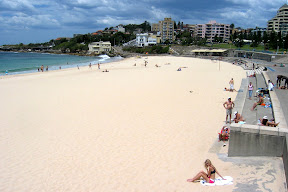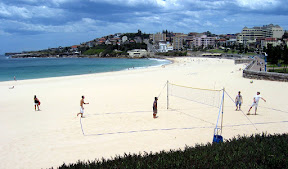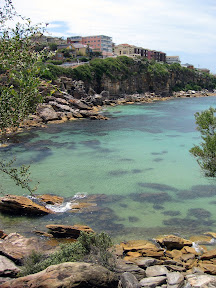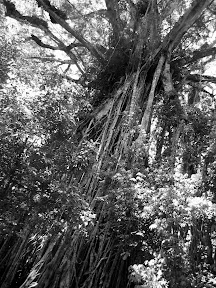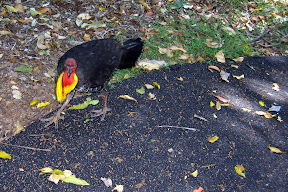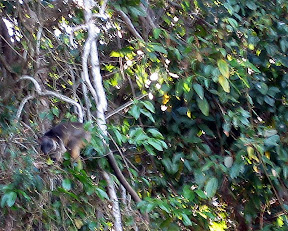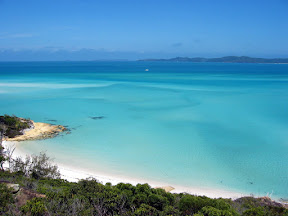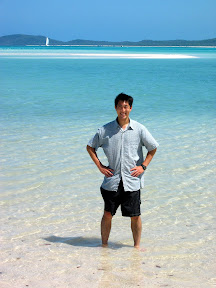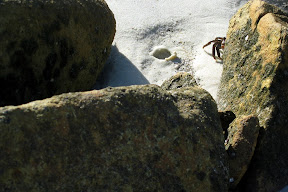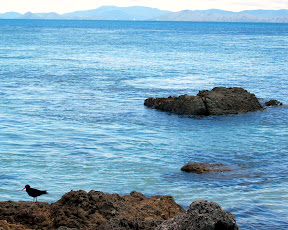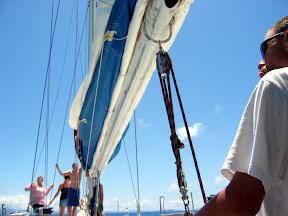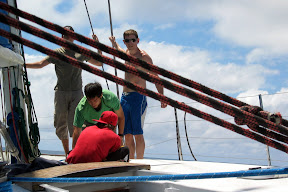Sunday, November 19, 2006
Heaven and Earth
This morning the weather was as foul as yesterday. So much for the assurances of the helihike company. Needless to say, today's helihikes were canceled. I signed up for a glacier hike instead, which is an eight-hour trip from the base. The agent told me there was one open spot on the 8:30 trek, which was five minutes away. I ran back to the hostel, grabbed my backpack and stuffed it with food and hustled back to the office.
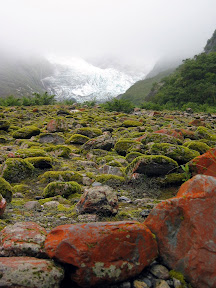
Tourists in blue jackets; guides in red
The entire group was made up of about 40 people. We drove by bus to the parking lot. Then we walked for an hour with our gear to the base of the glacier. The hiking guides split us up into three different groups, based on how fast we thought we could move. I volunteered to join Group A. After hearing a short lecture on climbing safety, we put on our ice cleats, grabbed our picks and started the ascent. The first thirty minutes were a breeze. Guides who had been on the ice all morning created steps with their picks, making the hike easy. But after a while those steps, which were deceptively steep, took their toll on me. After an hour I was spent. Worse, my heart beat faint and fast. I felt out of breath, and the lack of oxygen made my muscles feel especially tired. Not to mention, I couldn't feel my hands anymore. (The guide told us to leave our gloves off so we could get a better grip on safety ropes. I don't know how good a grip you can make, I thought, when you can't feel your fingers.) Still, I didn't want to stop and fall behind. I sucked it up and held up the rear.
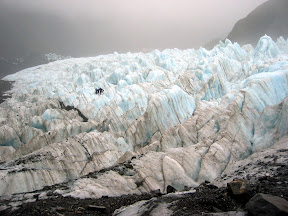
|
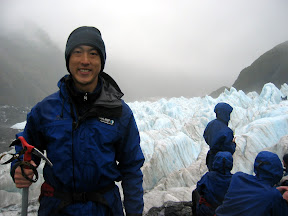
|
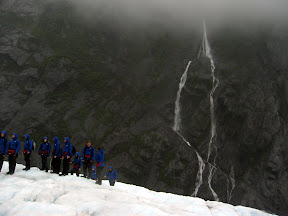
|

Steve, climber from Korea |
We finished our ascent at 12:30 PM: two and a half hours on the ice. We spent a relaxing hour eating our pack lunches. I met a Korean named Steve. He just graduated from high school and is now studying English in Auckland. Steve is an earnest guy. He likes listening to hip-hop and rock ("I love Oasis!") and wants to program video games.
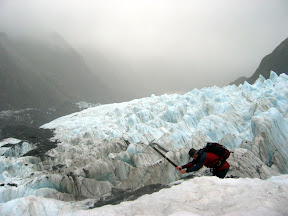
|
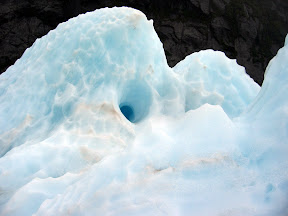
|
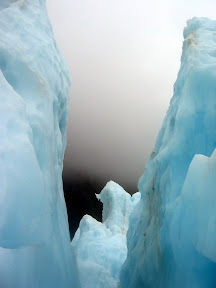
|
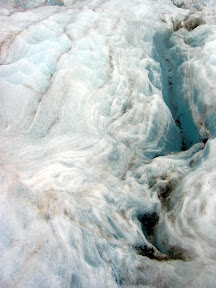
|
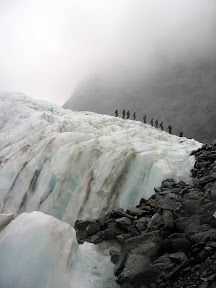
|
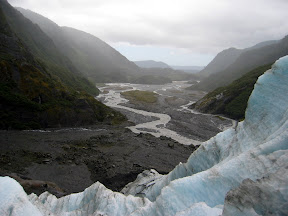
Valley below glacier |
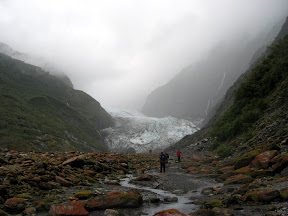
We reached on the top half of glacier |
The way down was much easier than the climb up. It only took an hour and a half to get back to base. And on the descent, the rain finally held up. The view on the glacier was gorgeous; unforunately, my camera lens fogged up, spoiling most of my shots.
When I got back to the village, there was only an hour to go before a skydive that I had signed up for. I had never skydived before; the largest motivating factor was Silke's roommate from Auckland, who was scared to death about it but was thrilled that she did it in such a beautiful setting. Although it wasn't raining, a dense layer of low clouds shrouded the mountains. I thought the dive would be scrubbed. But at 5:30, a driver from the skydive company appeared at my hostel, right on time. I went on the bus, along with five girls from the hostel. The driver, a tall woman with an upbeat attitude, promised us that the visibility was great.
The airstrip was located in a valley near Fox Glacier. It took thirty minutes to drive there. Along the way the driver answered questions and for the queasy ones, tried to temper their trepidations. Once at the airstrip, I saw the plane: a single-engine Cessna. It could only take two customers up at a time. I chose to go last. I wasn't nervous, but the other passenger on my flight—a cheerful Italian girl named Aurora—was. Two Irish girls, who were the first to go, jumped and returned to the airstrip before we went. They were ecstatic.
At 7:30, just before sunset, Aurora and I took off. The plane was cramped—I had to sit in the lap of my instructor, who was attached to me and would open the parachute and control it after we jumped (this is known as a tandem jump). I wasn't nervous on the ground, but flying in this small plane through clouds so thick we couldn't see a thing for one minute finally gave me the jitters. But when we broke through the clouds, the sight was glorious. New Zealand's two tallest peaks—Mt. Cook and Mt. Tasman—appeared to be floating on a bed of feathers. The evening sun bathed the snowcapped peaks in reds and oranges. (The scene reminded me of the Paramount Studios logo.) The pilot took his time circling the mountains, allowing us to snap photos of the majestic view. I was glad to go on this skydive, if only for this aerial tour.
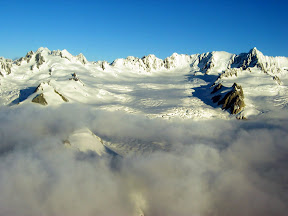
Mt. Cook and the Southern Alps
There was more to come. Aurora jumped first. It looked like she was sucked out of the plane. My instructor, an old kook named Robby, signaled for me crawl to the hatch. I stuck my body out of the plane. The wind whipped through me. He said something to me but I could barely hear. The next thing I knew, I was hurtling through space. Robby did a barrel roll so I could see the airplane disappear from sight, but I forgot to look until it was a mere speck. Then Robby tapped me on the helmet. I spread my arms and legs out. I don't remember breathing; I only remember the air roaring in my ears (and wondering if my ears would explode), the soft clouds getting bigger and bigger after each blink, brief glimpses of the mountains and the sun. From my jump at 12,000 feet, the freefall took 45 seconds. It felt ten times longer. As we descended into the clouds, I thought, when the hell is Robby going to pull the cord? A split second later, he did. The chute's opening jerked me around. Climbing though the clouds in a plane took a few minutes, but dropping by parachute took no time at all.
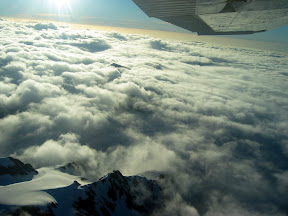
|
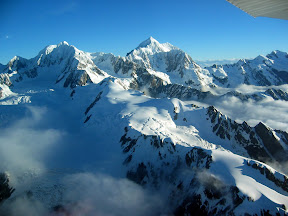
|
With the chute open we were still traveling quite fast, but there was no longer the rush of air in my ears. It was eerily quiet. When Robby told me to look a certain way, I heard him perfectly. We broke through the clouds. I saw fields below. They were bathed in dark light. I was preoccupied with pulling my camera out of my pocket, and so I missed a lot of good views. After I got the camera ready I had time only to take a few shots of views, and unfortunately, forgot to take one of myself. Then Robby told me to prepare for landing. When I landed, I looked up and saw Aurora still floating in the sky. What a gyp, I thought.
During the descent I felt queasy (aside from the barrel roll and violent chute opening, Robby did a full 360-degree turn), and after I landed I didn't improve. After Aurora touched down we hugged and posed for pictures. We drove back to the airstrip to get the other customers and finally went back to Franz Josef Village. I tried hard not to lose my lunch.
I returned to the hostel at 9 PM. I had a hell of a sore throat—a gift from my French friend David in Christchurch—and had to go to the kitchen to do a salt gargle. There I found Aurora. She was cooking dinner and was looking for pasta. I went back to my room to get a package, as well as some other food to share. We had a good time cooking and eating. I learned that she is 24 and was studying economics in Wellington (New Zealand's capital) on an exchange program. Her term finished so she is touring the country. Back in Italy, she comes from the southern city of Calabria, on the toe of the boot, but studies in the far north in Milan. I liked Aurora's warm nature. She said she had a tough time making Kiwi friends (as did Silke). Even worse, she ran afoul of some ugly Americans. One of her roommates, an American, moved out to live with her boyfriend early in the term but insisted she keep her space in the flat. She left food on the shelves and in the fridge for months. Aurora eventually cleared it away, but when the roommate returned some time later and saw what happened, she snapped. I agreed that many Americans possess this "me first" attitude. Still, Aurora hopes to visit the States someday.
This was a long day of extremes—from trudging on earth and ice to floating in air. I enjoyed connecting to Nature, and just as much, connecting to people. On a personal level, my journey so far, in which I have come across great numbers of homogeneous Northern Europeans, has been like traveling under dark skies, but getting to know solo travelers like Steve and Aurora is like finding rays of light.
Saturday, November 18, 2006
Do They Think We're All Like Billy Bob Thornton?
After an uneventful night, I left Greymouth this morning to start my bus tour of the South Island. The company, Magic Bus, is one of two major bus operators in New Zealand. This outfit was reputed to cater to stodgy, older travelers. (Its competitor, Kiwi Experience, is said to burst from the seams with horny collegiate Europeans.) This season, however, Magic Bus slashed its prices, and so my bus had a good share of young backpackers. The rowdier ones, invariably English, sat in the back, boxes of beer under their seats. English made up the majority of passengers, followed by other Europeans. When I boarded the bus, none of them paid attention to me. I sat next to a Korean girl in her mid to late twenties. When we got on the road, I started to talk with her. She told me that she studies English in Auckland.
This morning the rain let up, but the skies were still ominous. The four-hour trip was a race to get to our destination ahead of the rain. As impatient as I was, the bus still stopped three times. First was Hokitika, a jade town. Then Ross, a former gold mining outpost. At both stops the passengers had ample time to smoke a cigarette and buy trinkets to support the local economies. The final stop was a backwoods "Bushman" center. This featured domesticated deer, an opossum petting zoo, a wild pig, and a video chronicling the nation's deer farming industry. (I paid 4 NZD for the last item and wished I could have it back.) This must have been the biggest attraction for miles around because four other tour buses parked here at the same time. For all the business Magic Bus was bringing to these Podunks, not to mention the time lost in getting us to where we really wanted to be, the least the company could have done was give us a rebate.
That desired destination is the Franz Josef Glacier. It's unique because it descends from the Alps to a very low elevation, terminating in a sub-tropical rain forest just a few miles from the sea. It's one of the most accessible glaciers in the world. I planned to explore it on a helihike. In this activity, you ride a helicopter up to ice caves that climbers starting from the base would not be able to reach in one day. The helihike is only two hours, which meant I could do it this afternoon and rejoin the bus the next day.
We arrived at Franz Josef Village at 1 PM. The weather was absolutely dreadful; it only rained harder as the day went on. I checked in at the helihike office just to hear that all hikes today were cancelled. I could have stayed in for the rest of the day but I didn't want to be cooped up in a damp, crowded hostel room. Instead I walked to the glacier, which was four kilometers away. Covered by a rain jacket, I reached the halfway point when a minivan stopped and opened its door. I hopped in. The vehicle's passengers were a group of Scottish retirees who wanted to see the glacier from a safe distance. When we reached the parking lot of the viewing point I thanked them, but walked away from the glacier to the Lake Wombat Track, recommended by the visitors center. I walked for a half hour on a trail that was shrouded by thick foliage and a dense mist. Of course, I got soaked. All I could show for it was a tui sighting (a songbird native to New Zealand) and some waterfalls. Granted, the heavy downpour made the the creeks and cataracts rage.
<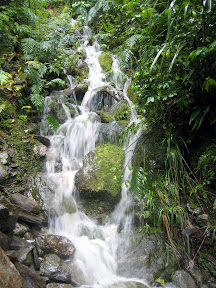
Rainy weather makes magnificent waterfalls
I returned to the village by evening. By then the rain had suspended, and the sky cleared for just a few minutes. But this respite revealed a magnificent sight: the snow-capped peaks of the Southern Alps. They were so enormous and so near that it was a wonder that they had been completely invisible up till now.
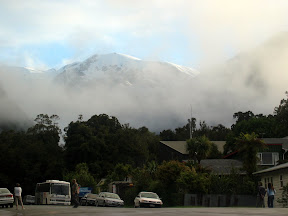
First day in Glacier Country: sun broke through for fifteen minutes
The hostel I stayed in was pretty big, but most of its guests were in their rooms or having a drink in the village. I chose to stay in. I cooked a simple dinner and hung out in the common room the rest of the night. I met two girls from California who bought an old car and were driving around the island. Because of the uncooperative weather, they had been stuck here already for a few days. It had been a while since I last met Americans -- from my home state, no less -- but in spite of my eagerness to make conversation, we ended up watching a video: Love Actually. For it's boorish depiction of the American president, I thought it was an apt choice.
Friday, November 17, 2006
Wet, Woolly Ride
After a short breakfast, I bid my roommate David adieu and caught a shuttle to the train station. On today's agenda was the TranzAlpine, a half-day train ride to New Zealand's west coast. This journey is touted highly for its breathtaking scenery.
Not yet thirty minutes into the trip I was already enjoying the view. Right outside the city were enclosures of livestock: sheep, cows, even deer! (Sustainable farmers in the States: eat your heart out.)
The train ascended a mountain range, the Southern Alps, which divides the west of the South Island from the east. As we climbed higher, the land got greener. Finally, after two hours, we reached Arthur's Pass. Even if you didn't have a map, you could tell that you had reached a major point. The weather turned from overcast to a hard rain. The inclement weather made spectacular waterfalls on the sheer cliffs lining the valley. The scenery became quite wild. Every now and then the river that the train tracks followed broke into rapids. Thin-trunked trees formed a dense canopy that covered the mountains.
Sitting across the aisle from me were two Canadian sisters and two guys, a young Swede and an Austrian wearing an army-style cap. The Canadians were very friendly and chatted with their companions non-stop. Midway through their conversation they began to talk about Americans. Their tone was, not surprisingly, unflattering. They recalled a recent encounter. "The Americans in my hostel talked to the Asians, like, 'You don't speak English?'" I didn't think I would be bothered by this Yankee bashing but I was. I thought their comments about the "ugly American" were smug and trite. To make matters worse, I couldn't ignore them; my iPod flaked out at the worst possible time. (This episode reminded me of the Australian hostel manager in Naples in 2004.)
Half past noon the train pulled into the port city of Greymouth. I stayed at a hostel a short walk away from the station called Neptune International Backpackers. This was one of the best accommodations I had for the entire trip. The premises, which used to be a hotel, had a charming maritime character. (Seashells in the bathrooms were a nice flair.) The showers were clean, the beds (no bunks) had reading lights, the rooms were heated and the patio even had a hot tub. At 20 NZD per day, this place screamed bargain. Sadly, hardly a soul could be found here tonight, or for that matter, in town, as I discovered later.
Only an hour after I arrived, Greymouth was walloped by a doozy of a storm. Despite the horrendous weather, I wanted to see the Tasman Sea, which was just a half mile away from the hostel. I put on my rain jacket, laced up my Merrells and braved the elements for a run. I ran a short distance up and down a small river that cuts through the town and then turned toward the sea. I reached the pier but I was blown backwards by a howling wind. Even worse, a dense mist stopped me from seeing anything at all toward the water. As I retreated to the hostel, I felt a squish under my feet; my supposedly waterproof Gore-Tex shoes were hopelessly soaked. Even though I didn't see the ocean, I enjoyed the run. I got to see interesting fauna: black swans and a ground bird that runs like a chicken when it scurries into bushes. (I found out later that this is a species of kiwi.)
Greymouth is a gritty town. It's the major coal processor on the west coast, which makes the port smell like asphalt. On this rainy day, the streets were deserted. The townies I encountered spoke with a vaguely Scottish accent. (The original settlers were indeed Scottish.) But despite the town's wet climate and its industrial ethos, its residents seemeed rather cheerful.
This night there was nothing to do. The local movie theater had its regular programming interrupted for a concert, featuring a singer named Yulia. I was intrigued by a visit from a Russian to the middle of nowhere, but I balked at the ticket price. In the end I just turned in early; the run made me sleepy.
Thursday, November 16, 2006
Next Time I'll Get BBQ
The flight from Sydney to Auckland was terrific. It was operated by Air New Zealand, which has a reputation for impeccable service, and this time they did not disappoint. This flight featured leather seats, ample legroom and delicious meals. This flight's service crew were much older than the flight attendants on Virgin Blue and Jetstar, the discount Australian domestic carriers. Some of them looked barely out of high school.
I am going to stay in New Zealand for eleven days. Almost all of this time I will be on the South Island, which is blessed with temperate rainforests, snow-capped mountains, glaciers and fjords. (I thought the South Island's mild climate would be a relief from the hot weather of the last two weeks.) To make this schedule, I will pass through Auckland, New Zealand's largest city, for just one night and one day. Then I am off to Christchurch, the hub of the South Island, for one night. The following morning I will start a seven-day bus tour of the South Island. Then back to Christchurch for a day, from where I will return to Auckland and finally, San Francisco.
While I was in Australia I arranged to stay with someone in Auckland. This was through the fabulous travel website Couchsurfing.com, which I had used several times before to find a place to hang my hat and meet friendly locals. I actually tried to CouchSurf while I was in Australia, but strangely, not one person was able to host me. This time I found a friendly-sounding girl named Silke who lives near the center of Auckland. After staying in crowded hostels for the past two weeks, I was looking forward to a quiet night in a comfortable home.
I arrived in Auckland at 9 PM and took the AirBus to the city. I needed to get cash so I walked around the center in an area known as Sky City. Auckland is even more dominated by immigrants than Sydney. The main artery, Queen Street, is full of Korean, Chinese and Japanese restaurants and stores. Young Chinese walk down the street speaking Cantonese. In an alley I passed a group of Pacific Islanders. They chanted mockingly: "Ying yong yaw!" I guess it is only natural that this great influx from Asia has taken some people longer than others to accept. The kids here dress more like Americans than Aussies: sweatshirts, baggy pants and tennis shoes. I was more intimidated by them than by Aussies, but they still don't hold a light to San Jose Sureños or Richmond Crips.
I reached Silke's house at 10 PM. She greeted me with a broad smile. She was watching Woody Allen's Miranda/Miranda. She is 5'9", has light eyes and a fit build. As I talked to her, I learned that she is originally from Berlin. She moved to Auckland in February 2006 to study communications at a university here, and she will be here through next October. Her roommate Barbara came in. It turns out that she recently traveled to the South Island. She gave me some valuable advice, and completely made me rethink my itinerary. I was planning to breeze through each stop, but she told me to have a flexible schedule. I might like some place enough to spend an extra day or two, and of course rain, which is common this time of year, could hold me up. She suggested two very intriguing activities: skydiving at Fox Glacier and hiking on one of New Zealand's world-renowned tracks (or trails).
At midnight I called it a night. Silke let me sleep in a vacant room—it was the first time I had a room to myself this entire trip. It was great. I had a restful sleep. Next morning Silke shared some savory German bread with pate spread. Beat the white toast I was eating in the hostels. It was too bad I couldn't enjoy Silke's hospitality another night!
Today Silke didn't have any classes and she graciously agreed to spend the day with me to show me the city. Setting out from her home in Ponsonby, we walked on K Road and Queen St. toward the Ferry Terminal. From there we took the ferry to Devonport. This town has a hill with a nice view of Auckland Harbour and the city's skyline. Devonport is cute; it reminds me of Tiburon. After some time we took the ferry back to the city. Auckland reminds me of Sydney, but on a smaller scale. The streets are about as busy as Boston's are. We had lunch at one of the city's numerous Asian eateries, this one a Korean place. There was a big table of Chinese schoolboys in coats and ties, and another table with two Chinese girls watching a Korean variety show showing on the restaurant's flatscreen TV. I ordered oxtail soap. It wasn't as flavorful as the Chinese version.
Silke made for a good guide and companion. She is articulate and I liked talking to her about a variety of topics, including travel, of which she has done much. She did catch me off-guard one time when she asked me which country I visited had the most beautiful girls. Fortunately I had a ready answer (which you can tell when you read the archives of this travelogue).
At 2 PM we returned to her flat. I got my bag and wished her farewell. Silke has a brother who lives in the Bay Area, and she tries to visit him every now and then. I hope we'll meet again the next time she comes. I needed to catch the bus back to the airport. I ended up spending much more time than I expected waiting for the bus, and then waiting in traffic. I was sure I was going to miss my flight. I got to the airport 15 minutes before the flight was scheduled to depart and ran to the gate. When I got there I saw a throng of people waiting around a closed door; boarding had not yet started. I breathed a sigh of relief. Only in New Zealand could I have made the flight.
Better Than the Statue of Liberty
After barely missing my flight, I relaxed on the 90-minute plane ride to Christchurch. I arrived at 5PM. On the short bus ride from the airport to the center, I enjoyed the view. Tall deciduous trees, English country homes. They call Christchurch the Garden City for good reason. The glow from the evening sun finished this picturesque setting.
I got off the bus at Cathedral Square, the heart of the city. I already noticed an Asian presence. A big group of Chinese were playing soccer in the square.
I stayed at an immense hostel on the Square called Base Backpackers. After I got settled in I went down to the bar to check out happy hour. I thought there would be live music, but instead I got a drinking game version of Rock, Paper, Scissors. Amazingly, no one left—I guess you can't argue with $2 drafts.
After a while I was joined by my bunkmate, David. This was a 30-year old Frenchman; he was quite short but possessed a pair of biceps that warned to mess with him if you dared. That is, until he flashed his wide smile. I liked him immediately. He spoke English haltingly but gesticulated like nobody's business. We talked about Italian soccer ("I hate Materazzi"), cultural misconceptions ("France doesn't really hate Americans") and being a smart traveler (he advised me to wear "kingdoms").
David was wrapping up a month-long tour by bus around the whole country. I asked him why he chose New Zealand. He explained that he recently broke up with his girlfriend (she is 29 and wanted a baby) and wanted to get away from home for a while, though not necessarily to "mess around". Back home, he lives in a banlieue outside Paris, which is the French equivalent of public housing. He drives a bus and makes 1250 Euro ($1700) a month. I wondered how he could survive on that but he assured me he can live comfortably on that wage. (If he can afford to even travel abroad once a year, I can't argue.) I asked him if he felt safe in the banlieue; he responded that if he doesn't mess with anyone and he doesn't take s*** from anyone, there won't be a problem. Except for once getting a knife pointed at his chest, this attitude has kept him safe. Moving on to the bigger picture, I asked David, who is white, what he thought about North Africans, the poorest people in France who comprise a large part of the banlieues. (They also sparked a wave of violence last summer that threatened to engulf the cities.) He responded with a determined voice: they should try harder to integrate into French society. When I suggested that they can't because the same society doesn't give them jobs, David retorted, "Look at Zidane": the beloved soccer player of Algerian descent. "That's proof they can get a job!"
I enjoyed talking with David more than anyone else on the trip so far. His life fascinated me and his eagerness to share it with a total stranger—especially contrasted with the reticence of most others I had met—touched me. Because of the language barrier, he hadn't had much conversation on this trip. There was one British girl on the bus that he sat with because she spoke French, but aside from translating she didn't speak to him. (And forget about Aussie women, David told me—they're too tall!) At the end of the night, David gave me a map of the bus he took so I could plan my travels. "France's gift to America," he called it.
Wednesday, November 15, 2006
No Particular Place to Go
At 5:20 AM a taxi picked me up for the airport. It happened to be the country's first hybrid taxi. While the car was progressive, its driver wasn't. This was an elderly gentleman who didn't mince words when he blamed a recent rash of crime on Aborigines. He even called them the N-word. With immigrants rising in number, I wondered what whites thought of living in a multicultural society. Here was a sad answer.
I arrived in Sydney at 10:30. My flight for Auckland, New Zealand, was at 4:30 so I had a few hours to explore the city. I took a bus to Coogee Beach, a public beach a little bit south of Bondi. The ride was an hour long but it was worth it. Coogee is smaller but much less crowded. I walked north up the coast towards Bondi Beach. Nice homes dot the coastline. My favorite spot along this walk is Gordons Bay. It features sandstone cliffs and incredibly clear water. And because there's hardly a soul, you can stake out a spot on the rocks and enjoy the ocean view in peace. At 1 PM I returned to the beach. I walked up Coogee Bay Road, the trendy main road, and had a lunch of fish and chips. For its beauty, laid back vibe and small crowds, I would put Coogee at the top of the list of beaches I visited in Sydney.
I rode the bus back to the airport. I had to change buses at Randwick Junction, a bustling neighborhood ten minutes from Coogee. Randwick Junction has lots of Asian eateries and funky shops. It seems like a cool place to live. Back on the bus, I passed Anzac Parade near Maroumba, which also has many interesting-looking restaurants and shops. It was neat to ride the bus through these neighborhoods. Soaking in Sydney's multiculturalism and urban fashion was a nice change from the tourist/backpacker ethos of Cairns and Airlie Beach.
That does it for Australia. All in all, I had a fun time traveling up the Aussie East Coast. But I wouldn't do it again. Although I've never been to Hawaii or Mexico, I imagine that the beaches and forests there are much like those I saw in Australia, but a hell of a lot closer. I didn't get to see much Australian wildlife, but I don't have to travel twelve hours on a plane when I can see it at the zoo. I must admit that I loved Sydney and its big city vibe, and I wouldn't mind going back to see more of it. And for that matter, I still haven't seen Australia's other big city, Melbourne. But I'll take my time planning the return.
Tuesday, November 14, 2006
I'll Scratch Your Back If You Scratch Mine
Today I took a tour of the Atherton Tablelands, a mountainous forested region 90 minutes inland from Cairns. My tour, called On the Wallaby, had a mix of people. There was a Norwegian, an Italian, and a Bulgarian living in Melbourne, but most were British and Germans. The guide, named Bob, is a musician and even opened for INXS on their revival tour earlier this year.
We spent the first half of the tour walking through rainforest. We saw the Cathedral fig tree, one of the largest trees in all of Australia. We capped off the morning with a dip in Lake Barrie and a picnic lunch.
After lunch, most of the group went to see waterfalls, but I elected to go canoeing. I joined a smaller group for an afternoon on Tinaroo, an artificial lake. There were seven people in this group, three pairs and me. Everyone had their own two-person canoe except for me, and I had never canoed before. Still, I quickly got the hang of it. I signed up for this activity because I was told there was good chance of seeing Australian wildlife. I was not disappointed. Up to this point I had seen only one kangaroo, even though they are about as common in Australia as deer are in the States. But this afternoon I got a special treat—a sighting of a rare species of kangaroo known as Lumholtz's tree kangaroo. (Less than 1% of Australians have seen this kangaroo.) This species is about as big as a raccoon and has large eyepatches, too. It stayed frozen in the trees, watching our canoes as we tried not to startle it. We paddled up the lake to a deposit of ochre, an iron oxide compound that the Aborigines used to paint their bodies. We had a go at that with mixed results. After two hours on the lake we went back to shore and rejoined the waterfall group.
Back at shore I chatted with a couple of Canadians that canoed with me. Robin and Kathleen are nurses and are in Australia for one year, on special visas that allow them to work as nurses. To protect domestic jobs, they can work only in the outback in towns that are short of medical professionals. This seemed like a great way to travel—by living in a town without many tourists and interacting with locals on a meaningful level, they are getting a much richer experience than the typical working/travelling backpacker's.

Going aboriginal with Robin and Kathleen
At 5PM we drove back to Cairns. We listened to Canadian rock selected by Robin and Kathleen. In the back of the bus I saw an odd sight, a short man giving a British girl a massage. This man was Dave, a Brit of Chinese origin. The whole day he annoyed me, and creeped out a few others, by getting in everyone's face with his mega-zoom-lens SLR camera. Just before we left the Tablelands I heard him challenge this girl to see who could give a better massage. I was surprised that it worked—I guess I'll give it a try one day.
I got back to Cairns at 8PM. Since I would be flying to Sydney next morning and then leaving for New Zealand the same day, this was my last night in Australia. I met up with the Finn, Miruna, from the dive boat. She got back from the boat earlier in the day and was hanging out at her hostel. We had some drinks with other people in the hostel in an attached bar. After a couple of hours, these guys wanted to check out a bar in the center. Unfortunately, I had to pass. I had to wake up at 5 next morning to catch my flight. This was yet another case of my take-no-prisoners schedule holding me prisoner.
Monday, November 13, 2006
I'll Stick with "Take Me Out to the Ballgame"
I managed seven hours of sleep on the bus, but it was a rough, interrupted slumber. When I arrived in Cairns I was dead tired. I planned to spend five days in Cairns. The first four were with a certified dive course. On the last day I would be free to explore the forests around this tropical port city.
After checking in at the Tropic Days hostel outside of the center, I walked a good twenty minutes to the heart of town to Cairns Dive Centre. The first two days of the four-day course take place in the classroom and pool; the last two days would be spent on a "live-aboard" dive boat, where we complete our certification dives on the Great Barrier Reef. There were eight people in the class, including myself: two people from England, one Hong Kong Dutch guy (who naturally looked like he could play forward in the NBA), a girl from Hong Kong, another from Finland, and another couple from Finland who were the cheeriest people I met in Australia. The instructor, a short woman named Nikki, was a no-nonsense sort with a biting sense of humor.
The first day went as could be expected. I sat in the classroom half the time, watching videos, doing exercises in the textbook and trying not to fall asleep. In the pool I did well after the swim test, for which I had to cheat to pass.
After class I went back to the hostel. The people here are friendlier than in the other hostels I had stayed in—being far away from the action in the center of town helps. One of my roommates, an Israeli named Michael, was especially chatty. He had spent the first three days in Cairns walking around the city, recovering from jetlag. I hope he had bundles of money, because there isn't a whole lot to within the city except go shopping. At night I went with two others from the hostel to a bar in the center called the Woolshed. Their featured attraction is free dinner—consequently, a swarm of impoverished backpackers fills the bar every night. It wasn't until now that I realized how intricately designed the Australian tourist industry is. Bars and restaurants promote their specials in hostels, and run shuttles to pick up customers. You can book tours from pretty much any hostel in town. During class, our instruction was interrupted by a man who was permitted to promote his business, a multimedia presentation about the reef. For all the referrals that take place, I'm sure kickbacks play a big role. Cairns' economy is a thriving, complex ecosystem, much like the reef that it is built upon.
The next day a German girl joined our class. She was already certified but hadn't dived in years, so she needed a refresher. I sat with her in the back of the classroom. One thing she said about patriotism cracked me up. "I see American sports broadcasts and I hear 'God Bless America' every time. That makes me sick. If I sang 'God Bless Germany', you'd call me a Nazi!" After the class ended and we passed our final exam, Nikki the instructor shepherded us into the dive shop. Since the dive boat would provide equipment, I was not planning on buying anything here, but Nikki persuaded me into buying an overpriced mask and snorkel. To be sure, this mask was much clearer than the training device I used in the pool, but I felt bullied. I felt like a mark, too, because she let two students get away without buying anything. She knew well that I worked for a living. Of course, she gets commission on sales. I chose Cairns Dive Centre because it was $100 less than its competitor, but now it didn't seem so cheap anymore.
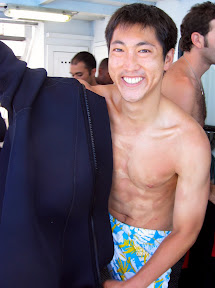
Sporting the world's worst sunburn
The next day my class started the live-aboard training. We traveled by catamaran 90 minutes out to sea to rendezvous with the live-aboard boat. We had lunch, then quickly got into the water for our first training dive. I had a tough time staying level—I would drift up a few meters away from my classmates, earning a nasty look from Nikki.
The next two days went like this: a dive, eating and relaxing on the sundeck, another dive. I spent most of my free time talking to my cabinmates. One is a graduate student originally from China named Bruce. He spent a couple of years in New Zealand and is now finishing his studies in Melbourne. The other is an American Marine stationed at the U.S. Embassy in Wellington, New Zealand. This soldier, named Aaron, has a relatively easy job (he's never been deployed to Iraq), although providing security—namely, ensuring the daily protests at the embassy against American foreign policy don't get out of hand—does take a toll. When Aaron described his military career he sounded earnest. He hopes to get technical training that will prepare him for civilian life. At the same time, he was sensible about being an American soldier far away from home. When he met other people on the boat, I never heard him introduce himself as a soldier. I guess he knows better than to trigger a tirade against the American president. I have tremendous respect for this man, who is just trying to make a living the best way he can.

With cabinmates Aaron and Bruce
On the second dive I figured out why I couldn't stay level: I wasn't keeping my legs and kicking above my head. My dives got much more enjoyable after I corrected this. I went on one more dive today, which was at night. The dive staff touted the night dive to no end. I didn't see anything extraordinary, though. When I got back to the boat a bout of seasickness hit me all of a sudden. I tried to relieve myself off the side of the boat, but it didn't make me feel better. I felt so bad I had to go to sleep at 9PM.
As bad as I had it, there was one person in my class who had it much worse. The Finnish girl, Miruna, couldn't adjust the pressure in her ears as she dove. That means her inner ears felt like they were going to get crushed if she didn't go back to the surface. As a result, she wasn't allowed to dive on the whole trip. Instead she had to snorkel. This was still really neat, she told me—and based on my own snorkelling experience in the Whitsunday Islands, I believed her.
To be honest, the dives were somewhat of a letdown. I saw more or less the same sealife on these dives as I did in the Whitsundays. To be sure, I did see a sea cucumber eviscerate itself, and I did get to touch the back of a giant turtle. But I didn't see any manta rays or even half the creatures that were hyped in the multimedia presentation I attended. I wondered if there was something wrong with me, because the pro divers on the boat said they saw something cool on every dive. These pro divers talk about dives like scratch golfers talks about their game. Because they always claim to have a good dive, you start to wonder if their boasts are empty.
On the second day of the live-aboard I dove three more times. Now that I had competed my certification dives, the class was over. As a reward, I had to watch a tedious video that was shot during our dives and was now being sold to us. It was bad enough I bought the mask and snorkel, so at $70 for this I drew the line here.
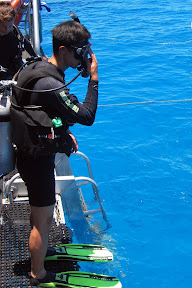
Hoping my contacts won't fall out
At 2PM the dive trip was over. A boat took me and two dozen others back to shore. On the 90-minute ride I talked to an American girl named Nina. She was the third American I had met in Australia (in thirteen days). We got along instantly. We were glad to make each other's company because, at the risk of sounding like an ugly American, we found it hard to relate to the Europeans we were meeting in Australia. I think this difficulty comes from a culture clash; Europeans are reserved and Americans are generally outgoing, even confrontational. Nina carped about an incident on the dive boat. She spotted a German pop the lid off a Gatorade cooler and dip her arm in it to scoop water. Nina, a little repulsed by this hygienic transgression, did not hesitate to admonish the European to use the spout. For her effort, Nina was met by a cold glare. On the flip side, Nina had a friendlier encounter with another German on the boat, a handsome dive instructor. Things went so swimmingly (no pun intended) that she was going on a date with him tonight. This prospect made her nervous, so I gave her a good ribbing to make her feel at ease. But I also felt a little envious—I wish it was me who made the connection (and not even a romantic one).

Nina, the third American I met in Australia
While Nina was getting ready for destiny, I spent an hour at a hotel bar on the waterfront with some people from the boat. Tonight at my hostel was the world-famous Croc BBQ. I tried to get back before it ended but the crocodile was all gone and there were only two morsels of kangaroo meat left. Deflated, I went back to my room, only to have an insufferable conversation with a British girl who had just checked in. At one point she asked me if Americans don't backpack because they are arrogant (America is so wonderful there is no reason to venture abroad). This comment struck me as a genuinely arrogant thing to say. This girl told a story about picking fruit at some nearby orchard—she was proud of the callouses and bruises she got. If she thinks she's "discovering Australia" or, even better, "discovering herself" through a few hours of menial labor, she's kidding herself. I smirked at the idea of her calling Mum at the end of that day, having a laugh over her toil, while hundreds of thousands of immigrants in the States do the same work, day in, day out, just to survive. I should have invited her to "discover America"—risk her life crossing the Mexican border and trudge as a maid in a hotel for minimum wage.
Thursday, November 09, 2006
You Can Pay Next Time
The cruise began bright and early on Tuesday morning. The boat is called Southern Cross. It's a racing yacht, which means a cramped cabin.
There are 15 people on this trip: three British couples, five Dutch girls, one middle-aged German woman, the captain and a deckhand and me. From the start, those two big groups acted cliquish and didn't appear friendly to me. The fun group that I saw at Beaches last night seemed like a cruel tease. What did I get myself into?
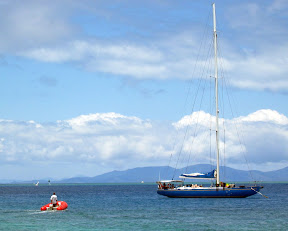
Southern Cross, yacht on which I sailed the Whitsundays
There wasn't any wind at all on this bright, hot day, so the captain, named Adam, revved up the motor and set off for Whitsunday Island. The passengers sprawled out on the deck. When we got to the island we set anchor and went ashore. We hiked to a beach on other end. This beach, called Whitehaven Beach, was marvelous. It has the purest, finest sand I've ever seen. (Captain Adam told us that the lenses of the Hubble Space Telescope were made from this sand.) The water near the shore is just as awesome. It is pretty shallow for many yards—you can wade in it and watch huge schools of fish, and even small sharks and rays, swim past you. Low tide is the best time to walk on the beach. When the waters recede, they leave other-worldly designs in the impressionable sands.
On the beach, met a flight attendant for a Mexican airline. Named Lorena, she was nice, and she proved that solo travellers and and travellers outside of Northern Europe are friendliest. She wore a silver bracelet, which was inscribed with her name, and curiously, her birthdate and phone number. All Mexican flight crew wear these bracelets to aid identification in case of disaster. I thought it was a tad morbid, but I suppose the Mexican culture is more comfortable with death (think: The Day of the Dead). Downside of this memento mori: never again can she give a guy a fake number.
We returned to the yacht in time for dinner. I had a terrible sunburn. I had slapped on sunscreen but it was ineffective—the worst part was that the burn was in random streaks caused by the roll-on applicator. I must have looked like a freak, but on the bright side it made me popular (or at least an object of curiosity). The Dutch girls started to talk to me, led by Marleen, the eldest of the bunch. I learned that they started out in a huge group—85 in all!— in Sydney, spent a week there together, then branched off. The youngest of the five girls in this group was 18. She was an absolute stunner, a doe-eyed 6'2" redhead named Rhea. More than that, she was nice to talk to.
Like other travelers I had met, these Dutch girls were able to find temporary work when they needed more money to keep their trip going. They had worked for a couple of weeks at a hotel in a resort town and picked fruit in an orchard. Australia wants backpackers to fill these menial jobs because natives won't do them. It's a win-win situation. The Dutchies spoke of this labor not as a means to an end but as a unique experience in itself. I thought this endearing, even glamorous depiction of immigrant labor made an ironic contrast to the comparable situation in the States. Then again, the situations really aren't that similar: the backpackers leave in one year when their visas expire, whereas immigrants in the U.S. stay indefinitely; the percentage of backpackers in the Aussie workforce is far less than that of immigrants in the American labor pool; since they are young, in good health and don't have families, backpackers pose a light strain on social services; and backpackers are regarded well by Aussie society because they spend lots of money on tourism.
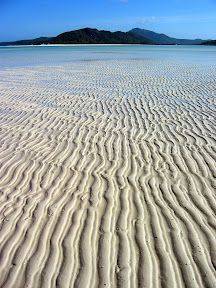
|
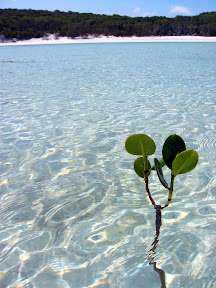
|
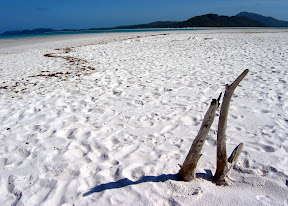 Whitehaven Beach
Whitehaven Beach
|
|
We anchored off Whitehaven Beach for the night. I spent a while looking for the constellation that inspired our sailing vessel's name, but it didn't come out from the clouds. I asked my boatmates a lot of questions about their cultures, but I didn't hear much interest about my own. The only question I received was from the youngest British couple: are American people really as fat as they see in the media?
I slept on the deck this night. After my experience I won't be doing it again. I had only a sheet to cover me and felt chilly the whole night. The rhythmic sloshing of the waves kept me up, and also made me get up to use the bathroom a couple of times. But the cabin, with its narrow bunks, wasn't much better. This type of sailing trip isn't for the luxury-minded. Showers are limited to 30 seconds, cold water only, and there isn't much room to change clothes. But for the experience and the price, I did not mind sacrificing a few comforts.
Despite getting a wink of sleep I felt restless. For a change of pace I went ashore. It was a nice, cool morning—after taking a short run I chatted with some of the Dutch, who were lying on the sand. Among other things, we talked about Holland's multicultural society, specifically its growing number of Muslims. I was surprised to hear these girls unanimously disapprove of the Muslim headcover. If these people come to our country and take advantage of our social programs, they reasoned, these same people ought to respect our culture by fitting into it. Having lived my whole life in the world's melting pot, hearing this—from citizens of a supposedly progressive society—was jarring. (Then again, my country did not have to suffer through what Holland faced this year, backlash against Muslims triggered by the murder of filmmaker Theo van Gogh by Islamic extremists.)
On a lighter note, I learned that "going Dutch" is indeed the norm in the Netherlands. There's still a place, though, for old-fashioned romance in Holland. On the first date, girls expect the guy to pay.
Later in the morning, the Southern Cross moved to a coral reef just off one of the islands. This was the ideal spot for my first-ever snorkel. It was amazing. Tropical fish of all shapes, sizes and colors. The coral was just as diverse and delightful. All of this was just a couple of meters from the surface. I even saw a turtle. As I am a poor swimmer, I tried a flotation device, but I ditched it after I discovered that the stinger suit I wore (to protect me from tiny poisonous jellyfish) was plenty buoyant.
Back on the boat, I spent dinner talking to Marleen. She told me that she came to Australia because this is the last year she can get a working holiday visa, which permits her to stay for one year. She quit her job back home and gave up her flat to come here. She showed me her memory book, a collection of photos and farewell messages from her closest friends. Backpacking for one year in Australia really is a once-in-a-lifetime experience.

Passengers of the Southern Cross. Marleen is next to me on the right; Rhea is in front wearing gray tank top.
At dinner, the Dutch girls talked about dancing the night away but I didn't believe them until Rhea put on a trance CD through the boat's PA system. Never mind a missing strobe light or shoes, for that matter: as if on cue, the girls all started to shake their behinds on the deck. (Adam noted, "Beaches [the bar where the "reunion" party takes place] tomorrow night will be interesting.") The music not only let loose the girls from their inhibitions, it also inspired the crewmen to become bold. Adam gave two of the dancing Dutchies a private (and gratis) dinghy ride around the island. Until now Clint the deckhand was on the sidelines, hardly saying a word to any of the passengers. He came out in a big way tonight, though. He danced with the girls and, noticing that the girls' plastic cups were empty, offered them wine left behind by the last group. Memorable sight: 5'5" Clint spitting game at 6'2" Rhea. As far as I could tell, all Clint's effort led to nothing tonight, but it may have sown the seeds for the last day of the voyage. As for me, tonight I was in the audience, not on stage. Trance just isn't my bag.

Adam and Clint, crew of Southern Cross
Next morning, we visited another beach and went snorkeling again. On this beach was another yacht. This group seemed infinitely cooler—there were younger people, comprised of pairs and singletons, relaxing and laughing. Sigh.
At midday we made our way back to Airlie Beach. I was glad the trip was ending. This third and final day was, in my opinion, completely expendable. I was pretty impressed with the beaches and snorkeling in the first two days of the trip, but now there wasn't much else new to excite me. Along the way the wind picked up. We were finally able to set sail. This was a sign that nature agreed with me.
When we returned to shore I got my bag from the hostel and prepared for my next leg of the trip: an overnight bus ride leaving tonight for the Great Barrier Reef city Cairns. I still had a little time to see my companions for the last three days once more. I went to Beaches at 7:30. I was the third person from our group there, after the youngest British couple. The Dutchies trickled in around 8. I was looking forward to hanging out with them for a few beers, and curious to see if Clint would appear and finish what he started last night. But I had a bus to catch. I said goodbye to everyone and went to the bus stop. After three days at sea, it felt good to be driving at 50 MPH on smooth roads.
